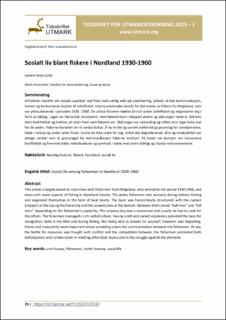Sosialt liv blant fiskere i Nordland 1930-1960
Journal article

Åpne
Permanent lenke
https://hdl.handle.net/11250/3107632Utgivelsesdato
2023Metadata
Vis full innførselSamlinger
- Tidsskriftet Utmark [67]
Sammendrag
Artikkelen handler om sosiale aspekter ved fiske med særlig vekt på sosialisering, arbeid, verbal kommunikasjon, humor og konkurranse knyttet til Lofotfisket. Intervjumaterialet består for det meste av fiskere fra Helgeland, som var yrkesutøvende i perioden 1930 -1960. De aktive fiskerne møttes årvisst under Lofotfisket og organiserte seg i form av båtlag. Laget var hierarkisk strukturert, med høvedsmann (skipper) øverst og skårungen nederst. Mellom dem stod heilkar og halvkar, alt etter hvor vant fiskeren var. Skårungen var nykomling og måtte som regel koke mat for de andre. Fiskerne forvaltet en rik verbal kultur. Å ha et rikt og variert ordforråd ga grunnlag for anerkjennelse, både i rorbua og under selve fisket. Kunne en ikke svare for seg, virket det degraderende. Ære og maskulinitet var viktige verdier som la grunnlaget for kommunikasjon fiskerne imellom. På havet var kampen om ressursene konfliktfylt og fremmet både individualisme og samhold i møte med andre båtlag og i kamp mot elementene. This article is largely based on interviews with fishermen from Helgeland, who worked in the period 1930-1960, and deals with social aspects of fishing in Nordland County. The active fishermen met annually during Lofoten fishing and organized themselves in the form of boat teams. The team was hierarchically structured, with the captain (skipper) at the top og the hierarchy and the scrawny boy at the bottom. Between them stood “half men” and “full men”, depending on the fisherman’s capability. The scrawny boy was a newcomer and usually he had to cook for the others. The fishermen managed a rich verbal culture. Having a rich and varied vocabulary provided the basis for recognition, both in the tiller and during fishing. Not being able to answer for yourself, however, was degrading. Honor and masculinity were important values providing a basis for communication between the fishermen. At sea, the battle for resources was fraught with conflict and the competition between the fishermen promoted both individualism and collaboration in meeting other boat teams and in the struggle against the elements.